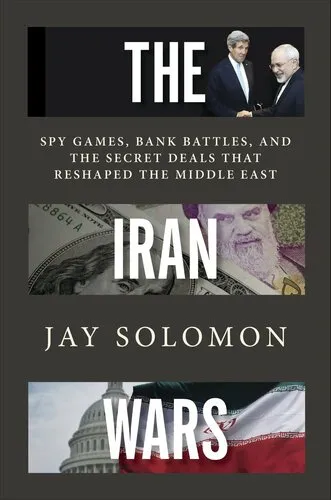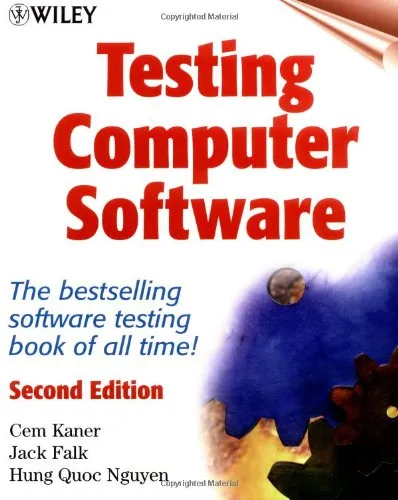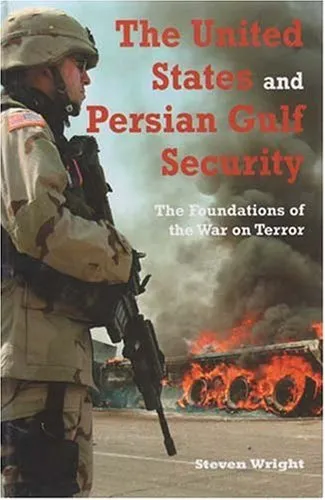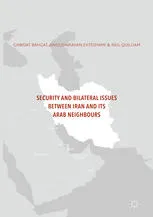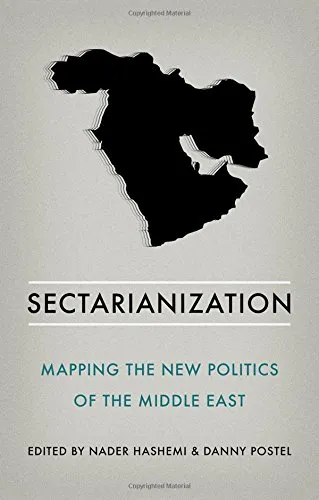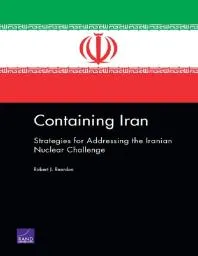The Iran Wars: Spy Games, Bank Battles, and the Secret Deals That Reshaped the Middle East
4.4
بر اساس نظر کاربران

شما میتونید سوالاتتون در باره کتاب رو از هوش مصنوعیش بعد از ورود بپرسید
هر دانلود یا پرسش از هوش مصنوعی 2 امتیاز لازم دارد، برای بدست آوردن امتیاز رایگان، به صفحه ی راهنمای امتیازات سر بزنید و یک سری کار ارزشمند انجام بدینکتاب های مرتبط:
معرفی کامل کتاب "The Iran Wars: Spy Games, Bank Battles, and the Secret Deals That Reshaped the Middle East"
کتاب "The Iran Wars" نوشتهی من، جِی سولومون، داستانی جذاب و مستند از روابط پیچیده و چالشهای دو دهه گذشته بین ایالات متحده آمریکا و جمهوری اسلامی ایران را روایت میکند. این کتاب بر سیاستهای بینالمللی، جنگهای سایبری، تحریمهای اقتصادی و مذاکرات پنهانی تمرکز دارد و تحلیل دقیقی از تغییراتی که این روابط بر منطقه خاورمیانه و جهان داشت ارائه میدهد. این کتاب نه فقط درباره تاریخ، بلکه درباره اثرات این اتفاقات بر جهان امروز است.
خلاصهای از کتاب
کتاب "The Iran Wars" به بررسی روابط پیچیده و پرچالش ایران و آمریکا از دوران ریاستجمهوری جورج دبلیو بوش تا دولت باراک اوباما میپردازد. این کتاب ما را به دنیای مذاکرات پنهانی و جنجالی میبرد، جایی که تصمیمات سیاستمداران برای دههها آینده تأثیرات عمیقی در خاورمیانه ایجاد کرده است. یکی از محورهای اصلی کتاب، تمرکز بر دو تاکتیک اصلی است که علیه ایران اتخاذ شد: از یک سو، استفاده از قدرت دیپلماتیک و مسالمتآمیز برای مهار برنامه هستهای ایران و از سوی دیگر، اعمال تحریمهای گسترده مالی که اقتصاد ایران را به چالش کشید.
این اثر تلاش میکند تصویری شفاف از فعالیتهای گروههایی مانند سپاه پاسداران انقلاب اسلامی، بهخصوص نیروی قدس، و نقش آنها در جنگهای نیابتی خاورمیانه ارائه دهد. در همین حال، تلاشهای هوشمندانه دستگاههای جاسوسی آمریکا برای بهدستآوردن اطلاعات، کارشکنی در برنامههای هستهای و دیگر تحرکات مشابه به تفصیل بررسی میشوند. این تناقض بین فشار و مذاکره در مرکز داستان قرار دارد و نشان میدهد که چطور سیاستهای دولتها توانستهاند تعادل جهانی را تغییر دهند.
نکات کلیدی کتاب
- بررسی دقیق برنامه هستهای ایران و مذاکرات برجام
- نقش تحریمهای مالی در تغییر رفتار اقتصادی و سیاسی ایران
- تلاشهای جاسوسی و خرابکاری در برنامههای دفاعی ایران
- نقش دولتهای مختلف ایالات متحده در رابطه با ایران و اثرگذاری آنها بر سیاستهای جهانی
- بررسی گروهها و کشورهایی مانند حزبالله، اسرائیل و عربستان سعودی و تأثیرات آنها در این منازعات
جملات معروف از کتاب
“In the trenches of Middle East policymaking, the struggle over Iran is sometimes depicted as a twenty-first-century version of the Cold War.”
“The Iran nuclear deal was never simply about Iran’s nuclear capabilities, but also about the country’s place in the Middle East and broader global politics.”
چرا این کتاب مهم است؟
کتاب "The Iran Wars" یک منبع جامع و عمیق برای درک پیچیدگیهای سیاست خارجی آمریکا در برابر ایران است. بهشکلی بیطرفانه حقایقی درباره دو دهه تاریخ معاصر ارائه میدهد که برای هر کسی که به سیاست بینالملل، امنیت جهانی و نقش خاورمیانه در تسویهحسابهای ژئوپلیتیکی علاقه دارد، ضروری است. این کتاب نشان میدهد چطور تصمیمهای دیپلماتیک و تاکتیکی میتوانند بر امنیت جهانی و اقتصاد بینالمللی تأثیر بگذارند. برای کسانی که به دنبال فهم بهتر از آینده روابط ایران و جهان هستند، مطالعه این کتاب امری ضروری است.
Introduction to "The Iran Wars: Spy Games, Bank Battles, and the Secret Deals That Reshaped the Middle East"
"The Iran Wars: Spy Games, Bank Battles, and the Secret Deals That Reshaped the Middle East" is an investigative tour de force by Jay Solomon, offering a compelling examination of one of the most complicated and consequential geopolitical rivalries of the 21st century. In this meticulously researched book, Solomon unveils the secretive and high-stakes battles between the United States and Iran that have shaped Middle Eastern politics and global power dynamics over decades. With espionage, clandestine negotiations, international banking systems, and shifting alliances as its backdrop, the book illuminates the profound consequences of these strategies on global security.
Drawing on years of firsthand reporting as a foreign affairs journalist and access to confidential sources and classified documents, Solomon details the intricate web of events, actors, and motivations driving U.S.-Iranian relations. Unfolding like a political thriller, "The Iran Wars" provides readers with a deeper understanding of the strategies that have defined this enduring conflict.
Detailed Summary of the Book
The book navigates through the complex history of U.S.-Iran relations, starting with the Iranian Revolution of 1979 and the hostage crisis that set the stage for decades of enmity. It delves into the intricate ways Iran carved its influence across the Middle East, particularly through its support for proxy groups such as Hezbollah and its nuclear ambitions, which have consistently been a flashpoint in international diplomacy.
Solomon takes the reader through the shadow wars fought between these two nations. From covert operations launched by U.S. intelligence agencies to counter Iran's influence, to Iran’s clever use of sanctions-busting schemes to sustain its economy, the book offers an in-depth look at the unconventional warfare that has defined this relationship. Solomon also explores the groundbreaking negotiations that culminated in the 2015 Iran nuclear deal, revealing the political calculations and secret meetings that shaped the agreement.
At its core, "The Iran Wars" underscores the stark choices and trade-offs both sides faced. By blending accounts of espionage, diplomacy, and economic warfare, Solomon highlights how these methods simultaneously brought moments of rapprochement and deepened hostilities. Throughout the narrative, the book raises thought-provoking questions about the efficacy of U.S. foreign policy, the role of sanctions, and the future of stability in the Middle East.
Key Takeaways
- The U.S. and Iran have developed a long-standing pattern of conflict rooted in ideological differences, geopolitical ambitions, and mutual distrust.
- Iran's nuclear program remains central to its global diplomacy, with the 2015 nuclear deal reflecting a rare moment of mutual compromise.
- Proxy warfare—conducted through groups like Hezbollah—has transformed regional power dynamics, giving Iran considerable influence in countries like Lebanon, Iraq, and Syria.
- The U.S. used economic sanctions as a primary weapon against Iran, targeting its banking system to cripple the nation’s economy and force diplomatic engagement.
- The book provides insight into how covert operations and intelligence strategies defined much of the modern U.S.-Iran relationship.
Famous Quotes from the Book
"Iran has mastered how to fight asymmetric wars by subsidizing allies, training proxies, and exploiting economic vulnerabilities, making it a formidable foe in unconventional ways."
"The nuclear deal wasn’t just diplomacy; it was geopolitical chess, a high-stakes gamble on trust, strategy, and necessity."
"Sanctions are an imperfect tool—they carry as much potential for creating desperation as they do for fostering compromise."
Why This Book Matters
"The Iran Wars" is essential reading for anyone seeking to unravel the complexities of Middle Eastern geopolitics and U.S. foreign policy. It provides profound insights into the covert wars and diplomatic maneuvers that remain central to understanding modern conflicts in the region.
What sets this book apart is its balance in reporting—capturing not just the American perspective but also the motivations and strategies that have driven Iran’s actions. From its economic policies to its military footprint, the book deconstructs Iran’s role as both a regional power and a global adversary.
In an era of rising tensions and fragile diplomacy, "The Iran Wars" serves as a timely reminder of the lessons learned—and forgotten—from decades of conflict and negotiation between Iran and the United States. Its nuanced insights make it invaluable for policymakers, analysts, and readers who want to go beyond the headlines to understand one of the most influential and contentious global rivalries of our time.
دانلود رایگان مستقیم
شما میتونید سوالاتتون در باره کتاب رو از هوش مصنوعیش بعد از ورود بپرسید
دسترسی به کتابها از طریق پلتفرمهای قانونی و کتابخانههای عمومی نه تنها از حقوق نویسندگان و ناشران حمایت میکند، بلکه به پایداری فرهنگ کتابخوانی نیز کمک میرساند. پیش از دانلود، لحظهای به بررسی این گزینهها فکر کنید.
این کتاب رو در پلتفرم های دیگه ببینید
WorldCat به شما کمک میکنه تا کتاب ها رو در کتابخانه های سراسر دنیا پیدا کنید
امتیازها، نظرات تخصصی و صحبت ها درباره کتاب را در Goodreads ببینید
کتابهای کمیاب یا دست دوم را در AbeBooks پیدا کنید و بخرید
1516
بازدید4.4
امتیاز0
نظر98%
رضایتنظرات:
4.4
بر اساس 0 نظر کاربران
Questions & Answers
Ask questions about this book or help others by answering
No questions yet. Be the first to ask!
